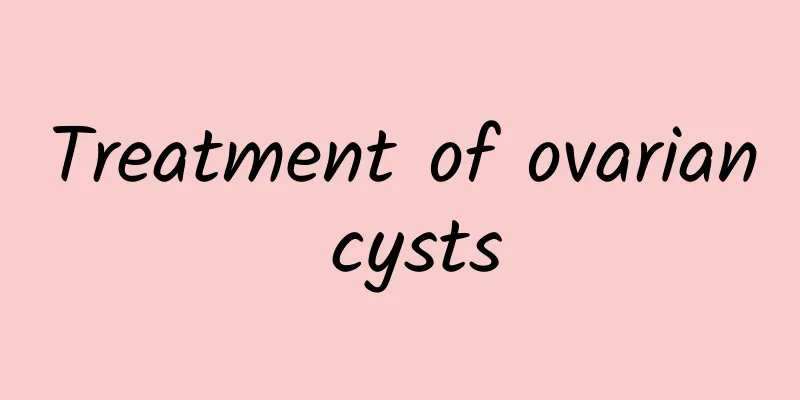Treatment of ovarian cysts

|
Ovarian cyst is a cystic structure formed inside the ovary or on its surface. Its treatment method should be determined based on the patient's actual situation. Commonly used treatment methods include general treatment, drug therapy, physical therapy, surgical treatment, and other treatments. 1. General treatment: For physiological ovarian cysts, if there are no physical discomfort symptoms and the cyst is small, you can observe it regularly to understand its changes. Maintain good living habits on a daily basis, such as going to bed early and getting up early, and avoid staying up late. Pay attention to personal hygiene, keep the private parts clean, and avoid gynecological diseases. 2. Drug treatment: For inflammatory ovarian cysts, you can generally follow the doctor's advice to seek antibiotic treatment, such as metronidazole tablets, cefixime dispersible tablets, etc. In some cases, such as endometriosis cysts, in order to prevent cyst recurrence or delay cyst growth, you can follow the doctor's advice to use hormone therapy, such as dydrogesterone tablets, medroxyprogesterone acetate tablets, etc. 3. Physical therapy: You can use a hot towel or hot water bottle to apply heat to the abdomen to promote local blood circulation and help alleviate the symptoms of ovarian cysts. Usually it can only be used as an auxiliary means and cannot replace the main treatment method. 4. Surgical treatment: For patients with larger cysts and obvious symptoms, they can cooperate with doctors to undergo surgery. Commonly used surgical methods include ovarian cystectomy, oophorectomy, and total hysterectomy. 5. Other treatments: For patients with malignant ovarian cysts, radiotherapy, chemotherapy and other treatments may be needed after surgery to inhibit and kill residual cancer cells and improve the patient's prognosis. Note: The use of drugs must be in accordance with the doctor's advice. Do not take drugs without authorization to avoid adverse effects. During the treatment, you should maintain a good attitude and avoid anxiety and tension. Regular review and follow-up should be conducted after treatment to understand the changes in the condition and the treatment effect. If you have any discomfort, you should seek medical attention in time. |
<<: What to do if there is excessive pelvic effusion and leucorrhea
>>: How to treat threatened abortion
Recommend
Knowing more about the symptoms of ovarian cysts can give patients more confidence
The ovaries are important reproductive organs of ...
Don’t take persistent dysmenorrhea lightly
There are many factors that lead to dysmenorrhea....
Are you a "holiday athlete" who is injured? Three warm-up exercises to reduce sports injuries
Are you a "holiday athlete"? Be careful...
Feeling depressed and irritable before going to bed, and feeling better after eating sweets? Nutritionist: Try these 5 happy foods
Thinking about many things and feeling irritable ...
What are the symptoms of endometriosis diagnosis?
Female friends with endometriosis should be diagn...
What are the dietary plans for amenorrhea?
When it comes to the dietary plan for amenorrhea,...
Do I need an IV drip after a medical abortion? It depends on the specific situation.
If the abortion is not complete after medical abo...
Routine examination methods for ectopic pregnancy
Ectopic pregnancy refers to the placement of the ...
How are uterine cysts formed?
The main cause of uterine cyst formation is infla...
How to reduce the frequent recurrence of cervical erosion
Patients with cervical erosion may experience inc...
What are the symptoms of biochemical miscarriage?
I believe everyone is very familiar with the term...
What medicine is better for irregular menstruation? 4 symptoms of irregular menstruation
The medication for irregular menstruation should ...
Will a molar pregnancy grow again after surgery?
Mole may grow again after surgery, and prevention...
Let's take a detailed look at the symptoms of cervicitis patients
Cervicitis can be divided into chronic and acute ...
Can I still have an abortion after three months?
Artificial abortion can still be performed within...









